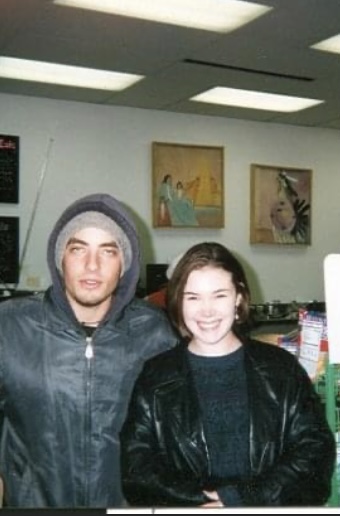from science to meaning
working with generational and existential shadows
Hi, I’m Sara Taylor, PhD.
I help people who’ve done a lot of personal and spiritual work but still feel stuck, like something deep inside keeps sabotaging their progress or blocking their momentum.
People who say things like:
- “I feel like life is passing me by, like I’m just on the outside of it”
- “I’m going nowhere fast, just spinning my wheels”
- “It’s like I keep hitting a wall, no matter what I do”
- “I’ve done so much work, but I still feel stuck”
- “I’m afraid I’ll die disappointed with how I lived”
- “I know something deeper must be going on”
This kind of stuckness isn’t laziness, or a lack of insight. There is something deeper going on. And that’s where my work begins.

Why I’m Here (and Not Still in Academia)
I got into generational and existential work after the year everything in my life turned upside down: my son was born, and three people in my family died, including my dad, the day before I was supposed to go back to work.
At the time, I was a neuroscientist working toward tenure as a psychology professor.
While I enjoyed teaching about stress, drugs, and mental illness, the research felt increasingly irrelevant to the weight of real human suffering.
That year broke all the structures I had built to keep me safe and comfortable for 35 years.
I held it together, like many of us do, but I couldn’t go back to pretending everything within the academic institution was okay or meaningful.
About a year later, I started looking for more meaningful ways to make an impact on human suffering. That’s when I found coaching, somatic trauma work, and eventually, generational healing and existential inquiry.
Now, I help others make sense of suffering by working with the very patterns, fears, and walls that keep them stuck, disconnected, or afraid to move forward.
What I Help With Now
The people who find me tend to be:
- former or current therapists and coaches, academics, doctors, artists/writers, and folks in in corporate leadership positions
- people who’ve done a lot of inner work already
They’re not in crisis. But they’re not fully living either.
They’re exhausted by how hard it feels to create, to connect, to stay in motion.
It’s a phase of growth most people don’t talk about.
What I help with is the in-between.
The stuck phase after things have stabilized, but before they’ve grown into something truly new.
That might look like:
- uncovering hidden loyalties to a parent or ancestor that block forward momentum
- thawing frozen grief, anger, or longing that’s been inherited or stuffed down to survive
- reclaiming the energy that’s been bound up in trying to do it all right
Why I Believe This Work Matters
This work isn’t about quick fixes or perfection.
It’s about becoming more capable of facing life’s challenges without falling apart.
It’s about freeing yourself from inherited patterns and opening up space for what truly matters to you:
- creative or meaningful work
- a more connected family
- the ability to feel more present, more whole, more at peace in your own skin
Through this work, my clients and I have been able to:
- Reclaim creativity and aliveness after years of disconnection
- Start and sustain meaningful work without spinning out or shutting down
- Free up energy and momentum
- Shift from chronic self-doubt and sabotage into self-trust
- Reconnect to a deeper sense of direction rooted in meaning—not just achievement
This work won’t perfect your life (because that is a pipe dream!)
But if you’ve done all the right things and still feel stuck, sabotaged, or vaguely lost, this may be the missing piece.
Relevant Training
To complement 15 years of teaching and research in the neuroscience of stress and mental health, I’ve trained extensively in generational trauma resolution, somatic healing, and systemic approaches to transformation.
Systemic & Generational Work
- Family Systems Constellations Foundations Training (Andrea Bosbach Largent; founder Bert Hellinger): Understanding and shifting generational trauma patterns with systemic phenomenology.
- GenoChart™ Multi-Generational Trauma Release Certification (Andrea Bosbach Largent): Certified in mapping and releasing multigenerational trauma using psychogenealogy.
- Compassionate Spirit Release & Curse Unraveling (Andrea Bosbach Largent & Gayle Revels): Advanced spiritual techniques for generational healing.
Somatic & Trauma Healing
- Integral Somatic Psychology, Module 1 + Developmental Trauma: Prenatal and Perinatal Stages (Raja Selvam): Somatic approaches to trauma integration through emotional embodiment, esp. of existential emotions.
- Complex Trauma Training Levels 1 & 2 (Janina Fisher): Working with trauma using nervous system and parts-based approaches.
- Treating Complex Trauma with Internal Family Systems (Frank Anderson): Using IFS for healing complex trauma by working with parts and the core Self.
- Dropping into Pre- and Perinatal Implicit Memory with Ease (Ray Castellino): Working with unconscious memories and nervous system imprints related to prenatal and birth experiences.
- Alchemical Alignment (Tele Dardin, Modules 1-3; founder Brigit Viksnins): A somatic approach to trauma resolution and embodiment, particularly effective for resolving freeze responses. Rooted in craniosacral therapy and somatic experiencing.
- Activate Your Inner Jaguar & Mobilize Freeze (Kimberly Ann Johnson): Focus on developing a healthy fight response and understanding nervous system regulation in women’s health.
- Somatic Self-Compassion (Kristy Arbon): Techniques for building emotional resilience and self-compassion through body-based awareness.
Coaching
- Wayfinder Life Coach Training (Martha Beck): Foundations of life coaching, the change cycle, and personal transformation.
- Existential Therapy, Psychotherapy & Counselling (Adam Godwin): Persepctives on growth, mental health, and crises related to existential givens.
Are we a good fit?
We might be a really good fit if several of the following are true.
- You generally have a logical or analytical mind or have worked in an analytical or logical background
- You value creativity and think that art is medicine, even if you don’t think you are a creator (yet?).
- You are actively involved in or interested in spiritual or somatic practices that connect you to your intuition.
- You can see that your parents were humans and that what they did/didn’t do had consequences for you, but you don’t blame them for every difficult thing in your life
- You aren’t afraid of the occasional exclamatory F-word
- You aren’t afraid of being triggered and tend to like intensity
- You think are somewhat neurodivergent, but probably haven’t sought a diagnosis
- You have done a lot of personal work already, from trauma therapy to mindfulness or yoga.
- You’re primary mental health symptoms throughout life have included anxiety and some depression but maybe not enough to be fully clinical depression.
- You already have a pretty good idea of what your work/profession is, even if it’s shifting.
take the first step
Shadowlands Consultation
Uncover insights into elusive barriers and ancestral experiences that hold you back, while reassessing your strategies and support to identify why you’re stuck and navigate a way forward.

Still here!?
Well, here are some additional unusual tidbits about me!
- I’m named after Bob Dylan’s ex-wife and the song he wrote for her: Sara. I’m basically named after a heartbreaking divorce.
- I met Bob Dylan’s son, Jakob Dylan, of the Wallflowers at a gas station when I was 16. I got his autograph and told him I was named after his mother, at which point he asked the awkward question of whether my parents knew her. Ummm. No just really big fans. LOL. He still put me on his personal guest list to get into his sold out concert for free that night.
- In high school, one of my best friends and I performed choreographed dances to ABBA songs at parties. That was the beginning and end of my performing career.
- My favorite job other than my current one was shoveling manure on a horse farm.
- I once accidentally ate a “special” brownie in graduate school and spent the rest of night using my knowledge of psychopharmacology to talk myself down from going to the ER.
- I once tried to lead a “chocolate” mindfulness meditation in my behavioral endocrinology class to introduce our mindfulness-based stress reduction project. I was self-conscious and started laughing SO hard that I ended up snorting like a pig. Never again. lol.
- I used to be quite good at microsurgeries involving insertion of tiny catheters into the jugular vein of rats in order deliver IV drugs (pressing levers and all that). We used methamphetamine and “bath salts” in that lab.
- I published a review article on the neurocircuitry of addiction and one of the figures is an MRI photo of my own brain. Though now that we have way more than “PowerPoint” to create images at our fingertips, the graphics are a tad embarrassing.
- I am the worst text typer. Between my typos and autocorrect you have to basically learn a new language to communicate with me.


